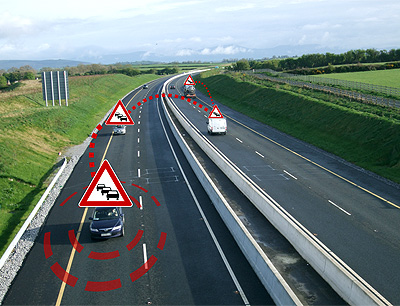“Intelligent” vehicles providing improved safety

“The objective is clear: Road traffic needs to become safer and traffic jams should be prevented or at least become less critical,” explains Prof. Falko Dressler. He is a Professor at the Computer Science Institute coordinating the Computer and Communication Systems group. The aim is to achieve these objectives using Intelligent Transportation Systems (ITS), so to make cars aware of the current situation they are in, to make them able to analyze such situation, and, if needed, to communicate the obtained safety or traffic related information to the driver.
Wireless Communication
The vision of intelligent transportation systems can only become reality if all the vehicles can communicate among themselves and with stationary infrastructure nodes. This allows to exchange information and to learn about events or road conditions. “We are mainly interested in this information exchange – to make it more efficient and reliable and to enable vehicles to suggest an alternate routing in case of traffic jams or to inform the driver about unsafe situations,” explains Falko Dressler. This objective is extremely challenging: Cars are highly mobile and especially in urban scenarios the communication is difficult, because buildings and other obstacles are limiting the communication range. Thus, efficient protocols, methods, and algorithms need to be developed to overcome these issues.
“In Europe and in the US, dedicated frequencies have been reserved for these vehicular networks,” explains Falko Dressler. Within the next few years, many of the new cars will have radio communication technology installed to support Inter-Vehicle Communication (IVC). In this very application driven domain, industry and academia are intensively collaborating to realize this vision.
BIT School
In Innsbruck, Michele Segata is working on models and new findings in the area of Intelligent Transportation Systems in the scope of his PhD and supported by the BIT PhD School. The BIT PhD School is a joined activity of the universities of Bozen, Innsbruck, and Trento in the field of computer science. It has been founded in 2005 to support collaborations in research and teaching among the three universities. This way, synergetic effects can be exploited by relying on complementary expertise of the individual groups. The scientific coordinator of the BIT PhD School in Innsbruck is Falko Dressler. Since 2012, a new double PhD program has been started in which participating PhD students are co-advised from professors at two of the three universities. Michele Segata is currently pursuing this PhD program, co-advised by Falko Dressler in Innsbruck and by Prof. Renato Lo Cigno in Trento.